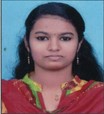Welcome to the Meet our Sustainability Scholars blog!
The Sustainability Scholars are international students that were awarded the DMU Sustainability Scholarship. Our scholars are from all across the world and are extremely passionate about the Sustainable Development Goals and sustainability. The scholars sat down with Dennis (Learning for Sustainability Frontrunner) to answer a few questions to get to know them better. Here’s our fourth scholar, Heera!
Dennis: Hey Heera! Tell me a little about yourself..
 Heera: My name is Heera Mary Raju. I am from India. I am a graduate in Zoology and now am doing MSc. in Advanced Biomedical Science from De Montfort University. I love to do cooking, gardening, listening music etc.
Heera: My name is Heera Mary Raju. I am from India. I am a graduate in Zoology and now am doing MSc. in Advanced Biomedical Science from De Montfort University. I love to do cooking, gardening, listening music etc.
Dennis: Oooo, I love to cook and listen music too! So how have you been settling in to DMU and the UK?
Heera: I am in UK for my higher studies. Because UK universities provide outstanding quality of education, countless studying options, solid infrastructural facilities etc. A degree that we gain from an UK university will be recognized internationally and the UK universities consistently rank amongst the best in the world. In DMU, according to British government assessment the teaching excellence is ‘Gold’. DMU ranked in top 50 universities in the world for sustainability. DMU has good teaching and non-teaching staff. All the members are caring and supportive and they are always available for students. DMU is one of the best university for education and facilities they provide. Not only for education DMU support extra curricular activities and also give importance to sustainability.
Dennis: Yes DMU is definitely a top class university that focuses a lot on sustainability. You’ve mentioned sustainability a few time, can you tell me why are you interested in sustainability and the Sustainable Development Goals?
Heera: Sustainability means satisfying the needs of the present without compromising the needs of the future, while maintaining a balance between economic growth, environmental protection, and social well-being. Education for Sustainable Development means including key sustainable development issues into teaching and learning; for example, climate change, disaster risk reduction, biodiversity and sustainable production and consumption. There are 17 Global Goals for Sustainable Development and these are interrelated with each other. DMU committed to making a big difference to the sustainable development agenda, by using the United Nations’ 17 Sustainable Development Goals (SDGs) as a focus for their teaching, research and other activities.
I am interested in sustainability and sustainable development goals because my course is focused on research and scientific experiments, so this sustainability knowledge will guide me to use the products and materials efficiently and with zero waste. It will really pull me to the Reduce, Reuse and Recycle concept throughout my study time at DMU and in a research profession.
Dennis: I actually never thought of zero waste in Biomedical Science so you’ve definitely taught me something there. How can the SGD’s assist you in your career development?
Heera: In the world of research, it is important to be able to find the right motivation. It is imperative that the idea of scientific discovery, the idea of finding something new, even discovering a smallest invention which may be used for treating or even curing people in some way or other. This single thought pushes me forward every day, even when I am feeling low. I am happy to solve global challenges and contribute my research in the well-being of the society. I am interested in cancer research because this deadly disease is increasing day by day. If I get a chance with this research there is no pollution occurred and the zero-wastage experiment will done. Also the laboratory waste water can treat and reuse for watering plants in the garden. Throughout my one year of course I will surely take part in the sustainability program and also share these messages or knowledge to others.
Dennis: Wow, you’ve really taught me a few things there about the importance of sustainable based research. To wrap this quick chat up, if you had one wish that you could only use on sustainability & the SDGs, what would it be?
Heera: Through research, teaching, operations, and community leadership, universities play a unique and vital role in assisting the world in achieving the Sustainable Development Goals (SDGs). Selecting all the 17 SDGs goal is sometimes impossible. Here I selected one goal that are related to my studies or future research profession. I took 14th goal ‘life below water’. Our ocean, the planet’s largest ecosystem is endangered. Healthy oceans, seas and coastal areas are essential to our existence, we rely on them for food, medicine, energy and water. Oceans are the source of life of the planet and the global climate system regulator. They are the world’s largest ecosystem, home to nearly a million known species. I am interested to do research in the field of drug discovery from marine species. There are lots of marine algae that are used as antioxidants, anticancer and antitumor agents, source of anti-inflammatory agents etc. The ocean absorbs about one-quarter of the CO2 that humans create when we burn fossil fuels (oil, coal and natural gas). Too much carbon dioxide in the ocean causes a problem called ocean acidification. Increasing acidification, ocean warming, eutrophication, plastic pollution, over exploitation of fish stock is threatening marine life and limiting the ocean’s capacity. We should protect these ecosystems. The one wish that I had to only use on sustainability and the SDGs is to participate the CO2 emission program and contribute my knowledge to reduce this problem and also save our largest ecosystem from pollution.
Dennis: I can definitely see your interest in Zoology and Biomedical Science merge together for this wish. Thanks for taking the time out to speak to me and I wish you all the best in your studies!
For more information about the DMU Sustainability Scholarship, please contact the Sustainability Team at sustainablility@dmu.ac.uk. Don’t forget to follow us on all our social media sites @SustainableDMU.

Leave a Reply